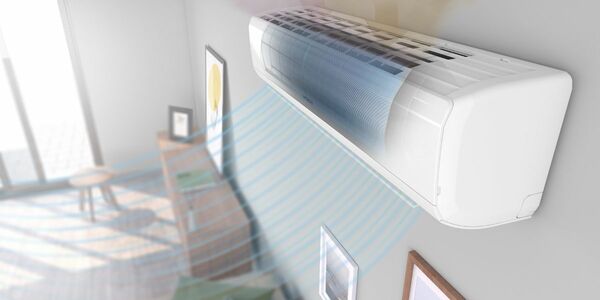Notifications
ALL BUSINESS
COMIDA
DIRECTORIES
ENTERTAINMENT
FINER THINGS
HEALTH
MARKETPLACE
MEMBER's ONLY
MONEY MATTER$
MOTIVATIONAL
NEWS & WEATHER
TECHNOLOGIA
TV NETWORKS
VIDEOS
VOTE USA 2026/2028
INVESTOR RELATIONS
DEV FOR 2025 / 2026
ALL BUSINESS
COMIDA
DIRECTORIES
ENTERTAINMENT
FINER THINGS
HEALTH
MARKETPLACE
MEMBER's ONLY
MONEY MATTER$
MOTIVATIONAL
NEWS & WEATHER
TECHNOLOGIA
TV NETWORKS
VIDEOS
VOTE USA 2026/2028
INVESTOR RELATIONS
DEV FOR 2025 / 2026
 Muhammad Azeem -
1 hour ago -
Family & Home -
Air Conditioners
-
1 view -
0 Comments -
0 Likes -
0 Reviews
Muhammad Azeem -
1 hour ago -
Family & Home -
Air Conditioners
-
1 view -
0 Comments -
0 Likes -
0 Reviews

Air conditioners (ACs) are a lifeline in hot weather, keeping our offices and homes cool and pleasant. Though they assist in controlling temperature, they can also affect indoor air quality (IAQ)—sometimes in favorable ways and other times in unfavorable ways.
This post will discuss how air conditioners affect the indoor air we breathe, the issues they could cause, and how to maintain excellent air quality while running them.
Understanding how ACs work will help one appreciate air quality before discussing it. Regarding air conditioning:
From within the room, pull in warm air.
Driven across refrigerant-filled coils, the air is cooled.
Eliminate air's Humidity or moisture.
Reverses the chilled air back into the room.
Blast hot air from an outdoor device.
This process influences indoor air in several ways, some good and others detrimental.
Most AC systems include air filters that catch dust, pollen, pet dander, and other airborne particles. For those susceptible to these contaminants, this can help ease respiratory problems and allergies.
High humidity fuels mold and dust mites, which aggravate asthma and allergies. ACs eliminate extra moisture, reducing the air's appeal to these allergies.
Stagnant air traps contaminants and might make you feel uncomfortable. ACs improve general air freshness by keeping air flowing, thereby preventing odours.
Although ACs offer advantages, improper maintenance could worsen air quality.
Dust and trash blocked the AC filters, restricting their operation. As a result, they can blast trapped toxins back into the room instead of clearing the air.
AC units' cooling coils and drip pans gather moisture. Regular cleaning helps prevent mold and bacterial growth and dissemination through the air, avoiding musty smells and health issues, including coughing and congestion.
Older or poorly maintained ACs could leak refrigerants or gather volatile organic compounds (VOCs), which could be dangerous if breathed.
While lowering Humidity is beneficial, too much air drying can cause dry skin, inflamed sinuses, and sore throats, particularly those with respiratory problems.
If an AC just recirculates interior air without bringing in fresh outdoor air, it can trap contaminants such as cooking smells, cleaning chemicals, and smoke within the house.
The good news is that following these ideas will let you enjoy cold air without compromising air quality.
Review filters one to three months apart.
Replace used disposable filters or wash reusable ones.
If your system lets it, better air purification can be achieved with HEPA filters.
Get your AC serviced at least once a year.
A professional may verify that no mold is developing within, check refrigerant levels, and clean coils.
Keep indoor Humidity between thirty and fifty percent.
Should the AC fail to sufficiently remove moisture, use a dehumidifier.
Attend to any water leaks close to the AC unit.
Open windows sometimes to allow in fresh air (where the external air quality is good).
Remove smells and wetness in bathrooms and kitchens by running exhaust fans.
Extra dust, allergens, and pollutants can be filtered out of an HEPA air purifier.
Some purifiers attack mold and germs using UV-C light as well.
Use aerosol sprays, powerful cleansers, and air fresheners sparingly close to the air conditioner.
Choose natural cleaners to help lower chemical accumulation.
Look for dripping pan standing water.
To stop mold, clean it with a bleach mixture—one bleach to ten parts water.
Look for these warning signs that your air conditioner might be aggravating air quality:
Musty or stale smells;
Enhanced allergy symptoms (sneezing, coughing, itching eyes);
Excessive dust surrounding vents;
Visible mold around the AC unit or vents;
Higher humidity levels despite the AC running
If you observe these problems, you should service or clean your air conditioner.
Air conditioners substantially influence indoor air quality, both positively and negatively. If improperly maintained, they can also disseminate dust, mold, and chemicals, even as they assist in filtering pollutants and regulating Humidity.
If you routinely clean filters, guarantee appropriate ventilation, and arrange expert maintenance, your house will remain cool, and your air will be clean. A little maintenance goes a long way toward ensuring your AC runs for you rather than against you.
